Christmas List 2011
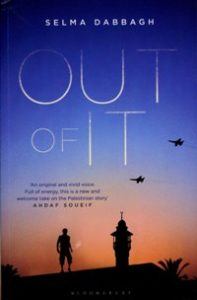 Maggie Gee Out of It, by Selma Dabbagh Bloomsbury, London, 2011, pbk, 320pp, £12.99, 9781408821305, www.bloomsbury.com Selma Dabbagh’s pacy, beautifully written first novel Out of It takes you to the heart of life for the young in Palestine today – as well as making viscerally real young (and old) Palestinian characters exiled by history from the home they long for. For Dabbagh’s central 27-year-old twins, the only way is ‘out of it’ – but the conflicts of class, education and culture that they experience both in Palestine and in Britain throw sharp, uncomfortable light on both countries. Sometimes funny, always gripping, its ending works as a metaphor for the world’s wider conflicts between rich and poor. Don’t miss it.
Maggie Gee Out of It, by Selma Dabbagh Bloomsbury, London, 2011, pbk, 320pp, £12.99, 9781408821305, www.bloomsbury.com Selma Dabbagh’s pacy, beautifully written first novel Out of It takes you to the heart of life for the young in Palestine today – as well as making viscerally real young (and old) Palestinian characters exiled by history from the home they long for. For Dabbagh’s central 27-year-old twins, the only way is ‘out of it’ – but the conflicts of class, education and culture that they experience both in Palestine and in Britain throw sharp, uncomfortable light on both countries. Sometimes funny, always gripping, its ending works as a metaphor for the world’s wider conflicts between rich and poor. Don’t miss it. 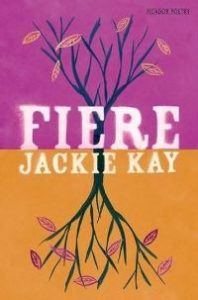 Lizzy Dijeh Fiere by Jackie Kay Picador, London, 2011, pbk, 72pp, £9.99, 9780330513371, www.picador.com Originating from an Igbo-Nigerian background myself I was particularly interested in the cultural associations infused throughout Fiere, Jackie Kay’s latest collection of poems, which is a warming exploration of identity and the emotional journeys that shape us. Using the creative lyricism, humour and flair that have marked much of her previous work, Kay takes the reader on a journey of self-discovery, allowing her Scottish and Igbo identities to co-exist through a combination of speech and rhythmic expressions, through her many stories that chart the different forms of friendships made along the way. From the title poem, ‘Fiere’, a Scottish term for ‘friend’ or ‘equal’, to the mouth-watering ‘Egusi Soup’and the hopeful but cautious ‘Road to Amadou’,we encounter a large number of companions and hereditary ghosts embedded in a fascinating collection that both moved me and contextualised our human and cultural complexities. A great ‘road-trip’ read.
Lizzy Dijeh Fiere by Jackie Kay Picador, London, 2011, pbk, 72pp, £9.99, 9780330513371, www.picador.com Originating from an Igbo-Nigerian background myself I was particularly interested in the cultural associations infused throughout Fiere, Jackie Kay’s latest collection of poems, which is a warming exploration of identity and the emotional journeys that shape us. Using the creative lyricism, humour and flair that have marked much of her previous work, Kay takes the reader on a journey of self-discovery, allowing her Scottish and Igbo identities to co-exist through a combination of speech and rhythmic expressions, through her many stories that chart the different forms of friendships made along the way. From the title poem, ‘Fiere’, a Scottish term for ‘friend’ or ‘equal’, to the mouth-watering ‘Egusi Soup’and the hopeful but cautious ‘Road to Amadou’,we encounter a large number of companions and hereditary ghosts embedded in a fascinating collection that both moved me and contextualised our human and cultural complexities. A great ‘road-trip’ read. 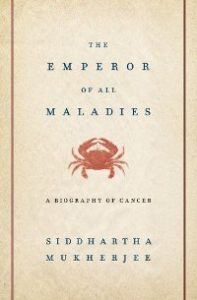 Muneeza Shamsie The Emperor of All Maladies: A Biography of Cancer, by Siddhartha Mukherjee Fourth Estate, London, 2011, pbk, 400pp, £9.99, 9780007250929,www.harpercollins.co.uk/about-harpercollins/Imprints/4th_Estate The Emperor of All Maladies: A Biography of Cancer by Siddhartha Mukherjee is a spellbinding book, an award winner, consisting of tales within tales and wonderful writing. Mukherjee’s journey of discovery and meticulous research, melds scientific ideas with lively, moving anecdotes, including physician Imhotep’s writings (c. 2625 BC), Queen Atossa of Persia’s mastectomy, Vesalius’s sixteenth-century anatomical drawings, and Marie Curie’s discovery of, and over-exposure to, radium. All this is knitted together with the passion and drive of pioneering doctors Farber, Halstead and others and recent investigations such as the genetic code of cancer cells. The triumphs and setbacks recorded embody the spirit of mankind and build an architecture around heroic battles fought by so many. The whole is linked by Mukherjee’s patient, Carla, and her struggle against leukaemia.
Muneeza Shamsie The Emperor of All Maladies: A Biography of Cancer, by Siddhartha Mukherjee Fourth Estate, London, 2011, pbk, 400pp, £9.99, 9780007250929,www.harpercollins.co.uk/about-harpercollins/Imprints/4th_Estate The Emperor of All Maladies: A Biography of Cancer by Siddhartha Mukherjee is a spellbinding book, an award winner, consisting of tales within tales and wonderful writing. Mukherjee’s journey of discovery and meticulous research, melds scientific ideas with lively, moving anecdotes, including physician Imhotep’s writings (c. 2625 BC), Queen Atossa of Persia’s mastectomy, Vesalius’s sixteenth-century anatomical drawings, and Marie Curie’s discovery of, and over-exposure to, radium. All this is knitted together with the passion and drive of pioneering doctors Farber, Halstead and others and recent investigations such as the genetic code of cancer cells. The triumphs and setbacks recorded embody the spirit of mankind and build an architecture around heroic battles fought by so many. The whole is linked by Mukherjee’s patient, Carla, and her struggle against leukaemia. 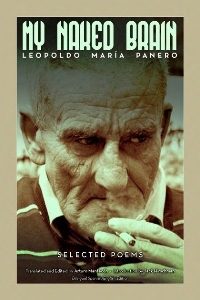 David Shook My Naked Brain, Leopoldo María Panero, translated by Arturo Mantecón Swan Scythe Press, Sacramento, CA, 2011, pbk, 58pp, $15.00 9781930454347, www.swanscythe.com Spanish poet Leopoldo María Panero has published prolifically since the 1970s, mostly from within the confines of psychiatric hospitals, like his current home in Gran Canaria. His exploration of drugs, alcohol, and sex have led to mostly superficial comparisons with Bukowski, but Arturo Mantecón’s translations in My Naked Brain – his first book-length collection in English – prove him to be a remarkably complex poet, as high-strung as a hummingbird and equally as capable of sudden turns. Panero’s cinematic poems relish a life without prescribed limits. ‘And so I offered her my naked brain/as obscene as a toad, as obscene as life…’
David Shook My Naked Brain, Leopoldo María Panero, translated by Arturo Mantecón Swan Scythe Press, Sacramento, CA, 2011, pbk, 58pp, $15.00 9781930454347, www.swanscythe.com Spanish poet Leopoldo María Panero has published prolifically since the 1970s, mostly from within the confines of psychiatric hospitals, like his current home in Gran Canaria. His exploration of drugs, alcohol, and sex have led to mostly superficial comparisons with Bukowski, but Arturo Mantecón’s translations in My Naked Brain – his first book-length collection in English – prove him to be a remarkably complex poet, as high-strung as a hummingbird and equally as capable of sudden turns. Panero’s cinematic poems relish a life without prescribed limits. ‘And so I offered her my naked brain/as obscene as a toad, as obscene as life…’ 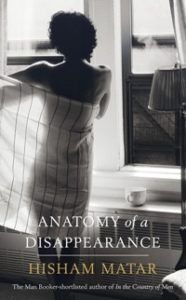 Mithu Banerji Anatomy of a Disappearance, by Hisham Matar Viking, Penguin, London, 2011, hbk, 246pp, £16.99, 9780670916511, www.penguin.com During Gaddafi’s regime, Hisham Matar’s father was abducted by Egyptian secret service agents. This book, written from the point of view of 13-year-old Nuri, is a son’s desperate appeal for closure on the absence of his father. Matar’s profoundly heartfelt narrative has a beautiful illusory quality about it, which drew me in from the opening line itself, ‘There are times when my father’s absence is as heavy as a child sitting on my chest.’ At its core the book is a tale of loss, and an often-disquieting reflection on the father and son relationship reinforced by Matar’s dignified and elegant prose. Anatomy of a Disappearance is a masterpiece of storytelling, bringing together the power of simple lucid prose and an inner depth and maturity which the author has triumphantly achieved. This is a moving and impressive novel which deserves to be on the bookshelf of every discerning reader.
Mithu Banerji Anatomy of a Disappearance, by Hisham Matar Viking, Penguin, London, 2011, hbk, 246pp, £16.99, 9780670916511, www.penguin.com During Gaddafi’s regime, Hisham Matar’s father was abducted by Egyptian secret service agents. This book, written from the point of view of 13-year-old Nuri, is a son’s desperate appeal for closure on the absence of his father. Matar’s profoundly heartfelt narrative has a beautiful illusory quality about it, which drew me in from the opening line itself, ‘There are times when my father’s absence is as heavy as a child sitting on my chest.’ At its core the book is a tale of loss, and an often-disquieting reflection on the father and son relationship reinforced by Matar’s dignified and elegant prose. Anatomy of a Disappearance is a masterpiece of storytelling, bringing together the power of simple lucid prose and an inner depth and maturity which the author has triumphantly achieved. This is a moving and impressive novel which deserves to be on the bookshelf of every discerning reader. 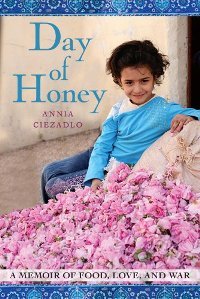 Azadeh Moaveni Day of Honey: A Memoir of Food, Love, and War, by Annia Ciezadlo Free Press, Simon & Schuster, New York, 2011, hbk, 400pp, $26.00, 9781416583936, imprints.simonandschuster.biz/free-press For nearly all of recorded history, from Thucydides to Robert Fisk, the genre of war memoir has belonged to men. Now that women fight in and report on modern wars, their accounts have nudged themselves onto the bookshelf, widening our view of how combat shapes, or more often disfigures, private and domestic life. In Day of Honey, the American foreign correspondent Annia Ciezadlo captures the wartime reality of Beirut and Baghdad through people’s struggle to answer the age-old question: ‘What's for dinner?’ Ciezadlo shows us that perhaps the best way of understanding a society and its war is through how people deal with food (the Lebanese stocked up on bread, while Iraqis yearned for the fish cafes along the Tigris River). Her memoir is frequently hilarious, laced with suspenseful moments of war zone escapade, and effortlessly instructive: she briefs us on Hezbollah, the generation that propelled the Arab Spring, and why Saddam Hussein’s father mocked Iraq’s Shiites for cooking chicken in pomegranate-walnut sauce.
Azadeh Moaveni Day of Honey: A Memoir of Food, Love, and War, by Annia Ciezadlo Free Press, Simon & Schuster, New York, 2011, hbk, 400pp, $26.00, 9781416583936, imprints.simonandschuster.biz/free-press For nearly all of recorded history, from Thucydides to Robert Fisk, the genre of war memoir has belonged to men. Now that women fight in and report on modern wars, their accounts have nudged themselves onto the bookshelf, widening our view of how combat shapes, or more often disfigures, private and domestic life. In Day of Honey, the American foreign correspondent Annia Ciezadlo captures the wartime reality of Beirut and Baghdad through people’s struggle to answer the age-old question: ‘What's for dinner?’ Ciezadlo shows us that perhaps the best way of understanding a society and its war is through how people deal with food (the Lebanese stocked up on bread, while Iraqis yearned for the fish cafes along the Tigris River). Her memoir is frequently hilarious, laced with suspenseful moments of war zone escapade, and effortlessly instructive: she briefs us on Hezbollah, the generation that propelled the Arab Spring, and why Saddam Hussein’s father mocked Iraq’s Shiites for cooking chicken in pomegranate-walnut sauce. 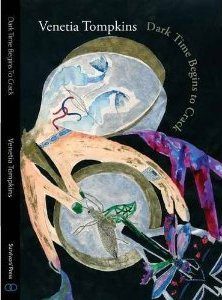 Debjani Chatterjee Dark Time Begins to Crack, by Venetia Tompkins, edited by Roy Birch Survivors’ Press, Survivors’ Poetry Mentoring Series, London, 2011, pbk, 74pp, £8.00, 9781874595342, www.survivorspoetry.org People Are Their Own Dreams, by Sean Burn, edited by Dr Simon Jenner 30pp, £5.00, 9781874595335 Finding Your Selves, by Trevor Innes, edited by Peter Street 48pp, £5.00, 9781874595366 These collections come from Survivors’ Poetry, a unique charity promoting the writing of survivors of mental distress. Their talented poets write memorably about mental illness. Tompkins writes about schizophrenia; her ‘Watcher’ comes ‘thrice damned,/to barter in the marketplace of mind’ (‘Negotiating Daybreak’). Her long elegant poems show tenderness, biblical cadence and wide vocabulary. Sean Burn by contrast writes short staccato poems in starkly modern language arranged like paragraphs. His editor comments: ‘his poetry lives in telegraph pauses. Language space-walks, un-mutilated by bourgeois line-breaks.’ Trevor Innes’s poems of political comment interact with personal poems of survival: ‘Swimming through shit I make it to the beach/ … I want something new.’ (‘Still Life – Is He Thatcher’s Child?’) Collectively, these voices reflect our times.
Debjani Chatterjee Dark Time Begins to Crack, by Venetia Tompkins, edited by Roy Birch Survivors’ Press, Survivors’ Poetry Mentoring Series, London, 2011, pbk, 74pp, £8.00, 9781874595342, www.survivorspoetry.org People Are Their Own Dreams, by Sean Burn, edited by Dr Simon Jenner 30pp, £5.00, 9781874595335 Finding Your Selves, by Trevor Innes, edited by Peter Street 48pp, £5.00, 9781874595366 These collections come from Survivors’ Poetry, a unique charity promoting the writing of survivors of mental distress. Their talented poets write memorably about mental illness. Tompkins writes about schizophrenia; her ‘Watcher’ comes ‘thrice damned,/to barter in the marketplace of mind’ (‘Negotiating Daybreak’). Her long elegant poems show tenderness, biblical cadence and wide vocabulary. Sean Burn by contrast writes short staccato poems in starkly modern language arranged like paragraphs. His editor comments: ‘his poetry lives in telegraph pauses. Language space-walks, un-mutilated by bourgeois line-breaks.’ Trevor Innes’s poems of political comment interact with personal poems of survival: ‘Swimming through shit I make it to the beach/ … I want something new.’ (‘Still Life – Is He Thatcher’s Child?’) Collectively, these voices reflect our times. 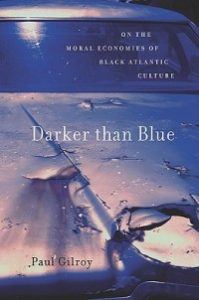 Lara Pawson Darker than Blue: On the Moral Economies of Black Atlantic Culture, by Paul Gilroy Harvard University Press, Cambridge, MA, and London, 2011, pbk, 224pp, £14.95, 9780674060234, www.hup.harvard.edu On the first page, the author confesses to a fear: that this book will be seen simply as a study of the collapse of the political in African American popular music. By the final page, you wonder why. This brilliant work weaves threads through 50 Cent, Jimi Hendrix, Jean Améry and Giorgio Agamben, to name but a few. Writing with the heart of an artist, Gilroy revitalises thinking about culture, consumerism, climate and much more. In doing so, he offers optimism at this time of relentless gloom. Darker than blue is to African American culture what The Wretched of the Earth was to Africa’s liberation movements: an act of salvage.
Lara Pawson Darker than Blue: On the Moral Economies of Black Atlantic Culture, by Paul Gilroy Harvard University Press, Cambridge, MA, and London, 2011, pbk, 224pp, £14.95, 9780674060234, www.hup.harvard.edu On the first page, the author confesses to a fear: that this book will be seen simply as a study of the collapse of the political in African American popular music. By the final page, you wonder why. This brilliant work weaves threads through 50 Cent, Jimi Hendrix, Jean Améry and Giorgio Agamben, to name but a few. Writing with the heart of an artist, Gilroy revitalises thinking about culture, consumerism, climate and much more. In doing so, he offers optimism at this time of relentless gloom. Darker than blue is to African American culture what The Wretched of the Earth was to Africa’s liberation movements: an act of salvage. 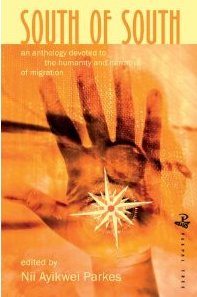 Leone Ross South of South: an anthology devoted to the humanity and narrative of migration, edited by Nii Ayikwei Parkes Peepal Tree Press, Leeds, 2011, pbk, 248pp, £9.99, 9781845231545, www.peepaltreepress.com This intense little anthology means to illuminate the complex detail of migratory lives – and it does so with a kind of beautiful ferocity. Editor Parkes selects stories from ten writers, and asks them that loaded question: how did you arrive here? Answer they do, through the visceral sensuality of Nam Le’s Tehran, to Naomi Alderman’s unexpected tale of homesickness and Junot Diaz’s frozen world of family. Nikki Aguirre also strikes hard, alongside the strange, delicate prose of Monica Arac de Nyeko. This collection is no easy bed-time read – and flawed – but its unerring commitment to the excavation of complex emotional landscapes can only be admired.
Leone Ross South of South: an anthology devoted to the humanity and narrative of migration, edited by Nii Ayikwei Parkes Peepal Tree Press, Leeds, 2011, pbk, 248pp, £9.99, 9781845231545, www.peepaltreepress.com This intense little anthology means to illuminate the complex detail of migratory lives – and it does so with a kind of beautiful ferocity. Editor Parkes selects stories from ten writers, and asks them that loaded question: how did you arrive here? Answer they do, through the visceral sensuality of Nam Le’s Tehran, to Naomi Alderman’s unexpected tale of homesickness and Junot Diaz’s frozen world of family. Nikki Aguirre also strikes hard, alongside the strange, delicate prose of Monica Arac de Nyeko. This collection is no easy bed-time read – and flawed – but its unerring commitment to the excavation of complex emotional landscapes can only be admired. 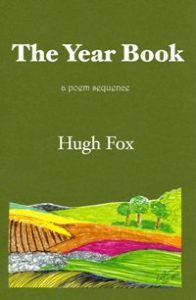 Luis Benítez The Year Book (A Poem Sequence), by Hugh Fox Ravenna Press, Spokane, USA, 2011, pbk, 70pp, $11.95, 9780983598251, www.ravennapress.com The Year Book is a testament of the life and literary work of the American poet Hugh Fox (1932–2011), who was also a scholar and an archeologist, with a profound interest in the comprehension of reality and, particularly, of human reality. The Year Book extensively develops his impressions, ideas and feelings, imbued with a strongly humane vision. The format of The Year Book consists of a single poem, divided into XXXXIV fragments. In the manner of the Latin poet Lucrecio in De Rerum Natura (On the Nature of Things), Fox builds a personal cosmogony which, in this publication, he donates to posterity.
Luis Benítez The Year Book (A Poem Sequence), by Hugh Fox Ravenna Press, Spokane, USA, 2011, pbk, 70pp, $11.95, 9780983598251, www.ravennapress.com The Year Book is a testament of the life and literary work of the American poet Hugh Fox (1932–2011), who was also a scholar and an archeologist, with a profound interest in the comprehension of reality and, particularly, of human reality. The Year Book extensively develops his impressions, ideas and feelings, imbued with a strongly humane vision. The format of The Year Book consists of a single poem, divided into XXXXIV fragments. In the manner of the Latin poet Lucrecio in De Rerum Natura (On the Nature of Things), Fox builds a personal cosmogony which, in this publication, he donates to posterity. 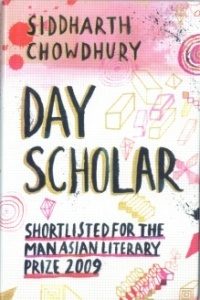 Anjum Hasan Day Scholar, by Siddharth Chowdhury Picador India, 2010, hbk, 164pp, Rs. 250, 9780330514064 This is possibly one of the best Indian coming-of-age novels ever. A close-knit group of male Bihari college students try to make it in early 1990s Delhi. The atmosphere is one of casual violence, sleaziness and indolence. Chowdhury captures the milieu with comic brilliance – everyone stereotypes everyone else on the basis of caste and community and yet these ways of seeing are crucial to making meaning of and finding one’s way through a conservative Indian middle-class world. The novel is also delightful for its evocation of pre-globalisation staples – Cuticura talcum powder, Graviera suitings and Bata Oxfords.
Anjum Hasan Day Scholar, by Siddharth Chowdhury Picador India, 2010, hbk, 164pp, Rs. 250, 9780330514064 This is possibly one of the best Indian coming-of-age novels ever. A close-knit group of male Bihari college students try to make it in early 1990s Delhi. The atmosphere is one of casual violence, sleaziness and indolence. Chowdhury captures the milieu with comic brilliance – everyone stereotypes everyone else on the basis of caste and community and yet these ways of seeing are crucial to making meaning of and finding one’s way through a conservative Indian middle-class world. The novel is also delightful for its evocation of pre-globalisation staples – Cuticura talcum powder, Graviera suitings and Bata Oxfords. 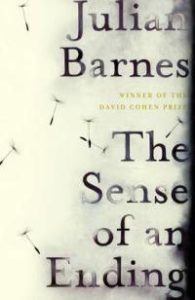 Brian Chikwava The Sense of an Ending, by Julian Barnes Jonathan Cape, London, 2011, hbk, 160pp, £12.99, 9780224094153, www.randomhouse.co.uk Julian Barnes skilfully takes a story with sweeping temporal scope and compacts it into an intense novel. Perhaps more than in any of his past books, with this one, it is easier to see the merits of Barnes’s concise style: it’s easy to fly big ideas off such prose. The novel opens with distinctly philosophical tonalities as the narrator, diminished in middle age, gazes back over his life. The major challenge Barnes faced here may, perhaps, have been to stealthily whittle down the penetrating, organising intellect of the beginning of the novel into that of the unreliable narrator of the story, a passive individual who let life happen on him. Sometimes things slip and high school lads mouth off staggering lines such as ‘History is that certainty produced at the point where the imperfections of memory meet the inadequacies of documentation.’ Still, a masterly accomplishment.
Brian Chikwava The Sense of an Ending, by Julian Barnes Jonathan Cape, London, 2011, hbk, 160pp, £12.99, 9780224094153, www.randomhouse.co.uk Julian Barnes skilfully takes a story with sweeping temporal scope and compacts it into an intense novel. Perhaps more than in any of his past books, with this one, it is easier to see the merits of Barnes’s concise style: it’s easy to fly big ideas off such prose. The novel opens with distinctly philosophical tonalities as the narrator, diminished in middle age, gazes back over his life. The major challenge Barnes faced here may, perhaps, have been to stealthily whittle down the penetrating, organising intellect of the beginning of the novel into that of the unreliable narrator of the story, a passive individual who let life happen on him. Sometimes things slip and high school lads mouth off staggering lines such as ‘History is that certainty produced at the point where the imperfections of memory meet the inadequacies of documentation.’ Still, a masterly accomplishment.
